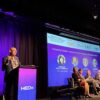Caitlin Gleeson, Global Leadership Development Lead at Canva joins Dr Nora Koslowski of MBS as co-host to discuss the changes in lifelong learning for leaders and graduates entering innovative workplaces such as Canva. The increasing scope for horizontal discipline and knowledge needs to be augmented by vertical capabilities in managing ambiguity and change. The case is made for different approaches by employers and new roles for and partnerships for higher education facilitators in meeting these needs.
Changing higher education for good
If you have any questions, suggestions or news please get in touch.





